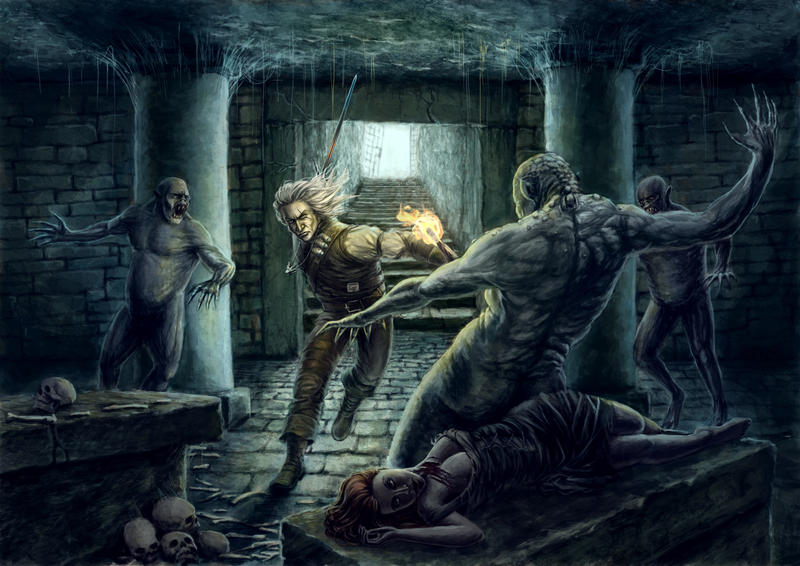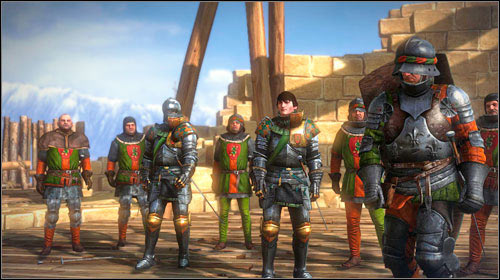 |
| Boromir's Last Stand by Deligaris |
A while back in my Dark Souls series I promised a post on how I handled Hit Points nowadays. The system is pretty revolutionary {ugh buzzwords are flowing into my vocabulary too often nowadays} compared to what we're used to and the idea just kind of hit me one day. Before I get into that though I want to discuss conceptually how one would get to this system, odd as it may be, and the influences that lead me to this system. As you can surmise Dark Souls certainly influenced a lot of my later redesign goals and it's approach to difficulty and lethality has granted a new perspective both to how I run games and now how I design them. I've come to appreciate death as the ultimate teacher and while "It Gets Worse" is a staple of mine there are times where I've let the dice lie and dealt out uncaring justice towards poorly thought out actions. Although most of the time though I prefer the gentler approach. Still when it comes to willful ignorance and devil-may-care recklessness I prefer the give-and-take lethality present in the Witcher games which values preparedness and research above all. A Witcher without his potions or his knowledge aberration anatomy makes for a poor monster slayer indeed.
Reckless is very easy to imagine. Biting off more than you can chew, taking on too many of the kings men instead of dashing through the nearest window; fighting a grizzly monster when you're not at full strength, pissing off the merchant and his retinue because you do not fear a caravan full of NPC guards and why should you? You have levels, they likely don't; you have a buffer of HP that they'll have to whittle down provided they can even hit you. In an ordinary Hit Point system, a high level character can be as bold, rude and contentious as they desire because only equally high level monsters or arch-villains are able to pose a sufficient threat but not always. I've identified two primary reasons for this, the first being that monster damage doesn't always scale with level. Sure the giant may be tossing around a lot of dice but others, especially a challenge that involves a horde of weaker creatures will be tossing out the same single die of damage you've seen your entire career. Well you might be thinking that each of those little hits are meant to add up and drag the hero down when he needs his strength the most. Speaking of heroes rescuing a damsel from distress single-handledly from a coven of nightmarish creatures is certainly a staple of heroic fantasy. Perhaps we could still allow this while also giving that constant fear of death a whirl. It's a lot more heroic to go in and try to save someone when there's barely a guarantee you'll survive.
 |
| Interrupted Feast by Heliofob |
The other more important reason (that I intend to drive a stake through its heart) is that the amount of HP you have left doesn't influence your actions until it is critically low. Until it has gotten to a point where the monster(s)' next wave of attacks could bring you to your knees you can continue doing what you're doing with a nice sturdy shield of HP in place. I've played though a great deal of different Wounds and death spiral systems, Exalted, Shadowrun, L5R to name a few and none of them make me want to cast away HP entirely. If anything they make me want to keep HP all the more, so instead let's alter how we think about HP for a moment; I'm not talking about how we represent it conceptually (getting out of dodge vs minor cuts and bruises) I'm talking mechanically without over complicating things. Before we get knee deep in numbers let's get back to that Witcher fellow and see how his games treat combat.
When I'm reckless in the Witcher 2 it means that I have walked right into a spiders lair and all his friends have come out to play while I'm busy hacking away at their Cocoons. I turn around, my back to a corner and realize there's no easy escape in this dense forest so I'll be forced to fight it out. One of the things I appreciate about the Witcher 2 is that when you are surrounded your face is likely to be bashed in, and it teaches you this early on. In fact in the introduction section you can choose through dialogue to fight one-on-one with the commander of a tower or fight them all. Even a monster-slaying mutant such as the Witcher is no match for 3 Knights, 2 Crossbowmen, a few men-at-arms and the skilled commander himself. I like this, a lot, it means that as a player and a hero you may be above the average Joe but there will always be safety in numbers. Going back to our giant monster spider example, these tough arachnids are quite capable of knocking you on your ass at which point you can expect to be dogpiled and devoured pretty rapidly. On their own they are an extremely easy foe to beat (incentive to lure off, divide and conquer) but together you're flashing steel can only do so much before you are overrun, your defenses shatters and your mutant heart beats no more. Still, should you prove canny enough, your steel sharp and swift you may yet pull victory from the jaws of defeat. Most of the time you'll be wishing you had remembered to drink a few potions ahead of time or at the very least not been a cocky ass.
It's odd that I use the Witcher for this example because in both of his games his Health Bar is one large number that goes down over time, and what I'm proposing is the opposite of that. It is entirely possible to replicate this style of play, where adventurers are encouraged not to bite off more than they can chew. You can make flanking or surrounded conditions highly lethal, you can also go into the game and tweak monster damage such that a few of them are likely to chew through your HP in a few rounds. Instead I'm proposing a change that will keep your HD / level, keep your monster damage the same as it was but alter how we treat Hit Dice and Hit Points to avoid the extremes of death spirals and carefree HP shields.




No comments:
Post a Comment